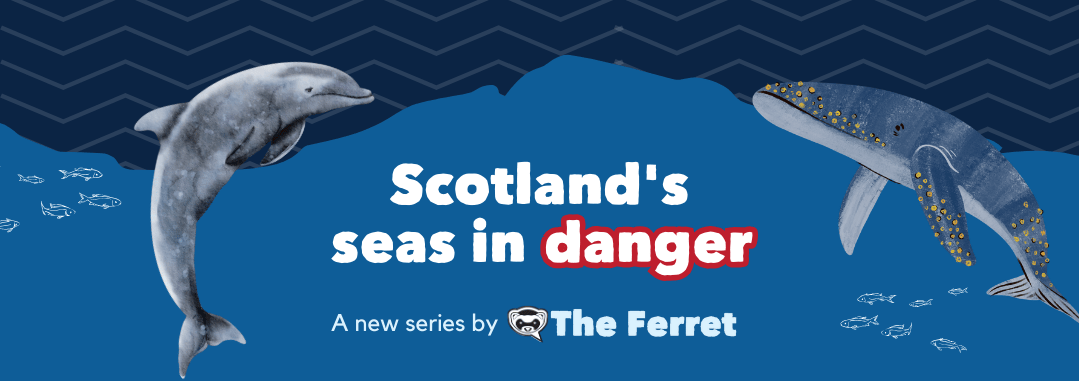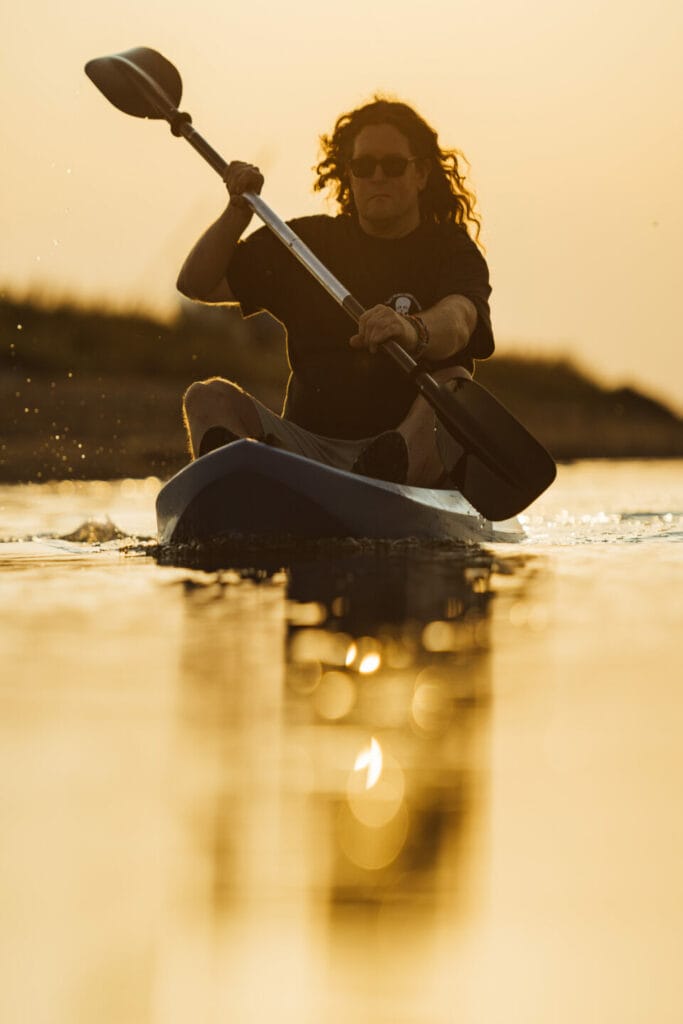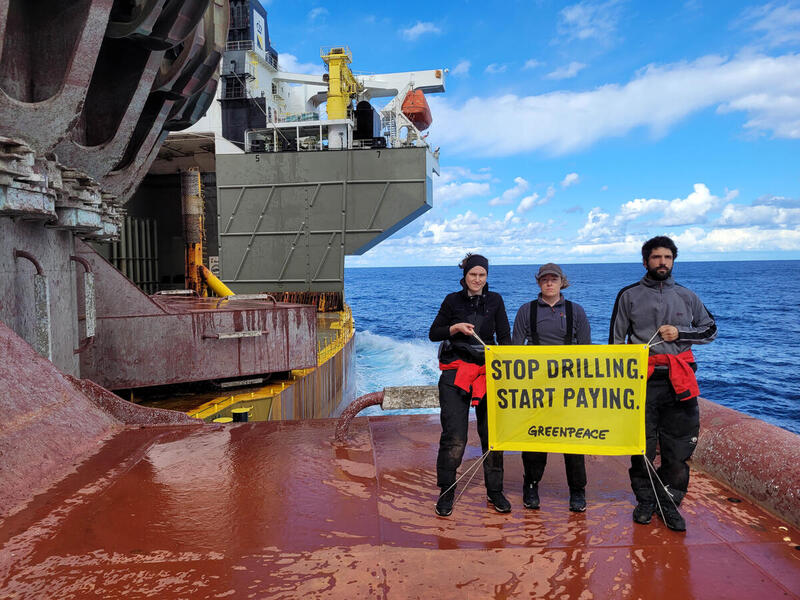Hundreds of environmental campaigners in the UK – including marine conservationists in Scotland – have received legal threats, prompting claims that private companies and the state are increasingly trying to silence critics with huge legal bills.
In Scotland, fish farm companies have been asking courts to stop campaigners approaching their sites and flying drones overhead, and oil giant Shell is seeking damages from Greenpeace of around £790,000 after a protest by a Scots activist.
The Ferret can also reveal that 540 Just Stop Oil and Insulate Britain supporters have been named on injunctions to prevent disruptive civil resistance. Another 114 have been imprisoned with their collective jail sentences amounting to 15 years, Just Stop Oil said.
An injunction – or interdict in Scotland – is a court order brought by a company or public body to prevent something.
Campaign groups claimed that the increasing number of legal actions by the government and corporate actors is an “attempt to silence” green campaigners.
Index on Censorship, which promotes freedom of speech, said responding to interdicts, is a “costly, complex and time-intensive process”, which can “further encourage activists to step away from their work”.
In reply, fish farm companies and Shell insisted that they respect the right to protest and that legal actions are simply to prevent activities which could endanger safety and peoples’ lives.
Our report on legal threats forms part of The Ferret’s new special series called Scotland’s Seas In Danger.

Activists facing legal action in Scotland include the veteran anti-fish farm campaigner, Don Staniford, who has filmed at salmon farms for years to expose environmental problems including the pollution of lochs from chemicals such as formaldehyde, which is used to embalm corpses. The UK government classified formaldehyde as a carcinogen in 2016 which means there are restrictions on its use, but it is permitted for use by the caged salmon industry.
Staniford has received three legal threats since 2021. He was in court this month following legal action by the Norwegian multinational, Mowi which won an interdict that said Staniford – or any of his associates – cannot go within 15 metres of its fish farms.
In Scotland breaking an interdict carries the threat of jail. This ruling effectively meant any environmental campaigners working with Staniford are also barred from the exclusion zone.

Staniford – pictured above – has appealed against the interdict.
In May 2023, the Coalition of SLAPPs in Europe (CASE) officially designated Mowi’s lawsuit as a strategic lawsuit against public participation (SLAPP) which, it says, is a lawsuit intended to censor, intimidate, and silence critics by burdening them with the cost of a legal defence until they abandon their criticism or opposition.
Last December, Bakkafrost Scotland Limited, a Faroese farmed fish company, also asked a Scottish court to stop Staniford covertly surveilling salmon farms. The application by the firm, an initial writ, asked the court to grant “an extended interdict” so he could not approach any of its farms within 15 metres, nor fly drones over its “leased areas of seabed”.
Staniford also received a legal threat last October from Scottish Sea Farms, which operates 60 sites in Scotland. The action said he must agree not to go within 15 metres of its sites or fly drones overhead.
We cannot protect free speech without protecting the right to protest.
Nik Williams, policy and campaigns officer at Index on Censorship and co-chair at The Ferret
Staniford’s legal costs at the moment are around £100,000 but that figure will be much higher if all three cases progress.
Activists protesting against North Sea pollution by oil firms are also facing legal action. They include Scots campaigner Imogen Michel, from Ayrshire, who was named as a defendant in legal action taken by Shell against Greenpeace for her role in a peaceful protest last year.
Michel, who lives near Girvan, boarded a Shell-contracted ship in the Atlantic Ocean with a banner bearing the message: “Stop Drilling. Start Paying.” She was one of four activists who staged the protest aboard the White Marlin vessel, just north of the Canary Islands.
Greenpeace said Shell is not seeking individual damages against Michel, although if found liable, consequences could include a permanent injunction preventing her from protesting on an oil platform again. The legal costs for Greenpeace could rise considerably beyond £790,000.
Michel told The Ferret she took action because Shell is “continuing to make huge profits from fossil fuels” as the climate crisis intensifies. She claimed the lawsuit is an “attempt to silence anyone who dares call for climate justice or opposes Shell’s ruthless pursuit of profit”. Michel added: “Countries and communities who have done the least to cause the climate crisis are being hit the hardest by it, while Shell keeps cashing in on sky high energy prices, handing billions to shareholders while slashing investment in renewables”.
Campaign group Just Stop Oil said that since the Insulate Britain campaign began in 2021, injunctions have increasingly been used by the state and private companies to “silence dissent by climate resistors”. A spokesperson for Just Stop Oil said its supporters are “very used to legal threats from fossil fuel companies and their expensive lawyers”.
People named on injunctions are often charged with the legal fees of the organisation seeking the injunction, the spokesperson explained. They added: “For example, lawyers acting for the government in respect of the National Highways Ltd M25 injunction (blocking protests on and around the M25) originally sought costs from bringing the injunction of £727,574 against the 133 defendants. Even if you have never broken the injunction you are still liable for these costs. There is no legal aid available for contesting the addition of your name to an injunction.”

Nik Williams, policy and campaigns officer at Index on Censorship and co-chair at The Ferret, said the increased use of legal threats has “severely restricted the space within which protesters and activists can operate to hold power to account”.
He added: “We cannot protect free speech without protecting the right to protest. Scotland is not immune to these threats as illustrated by the legal actions against Staniford and Michel and so it must work to ensure the necessary protections are in place to defend the right to free expression.”
A Shell spokesperson claimed its “intent has been misrepresented” and that the legal action against Greenpeace is “simply about preventing activities at sea which could endanger peoples’ lives – as happened last year – nothing more.”
They added: “The right to protest is fundamental and we respect it absolutely. But it must be done safely and lawfully. Boarding a 72,000 metric-ton moving vessel at sea was unlawful and extremely dangerous. A judge said Greenpeace protestors were ‘putting their lives and, indirectly, the lives of the crew at risk’. The legal costs to secure two court injunctions to prevent further boarding were significant. So were the costs for the companies who had to deal with the action at sea, for example by mobilising an extra safety vessel and increasing security at the port.”
The safety of the protestors – as well as the crew – was paramount, the Shell spokesperson added. “Rightly, we did not hesitate to put in place measures to protect all people involved. Shell and its contractors are entitled to recover the significant costs of responding to Greenpeace’s dangerous actions.”
The right to protest is fundamental and we respect it absolutely. But it must be done safely and lawfully.
Shell
Ian Roberts, director of communications at Mowi, said its interdict does not impede on Staniford’s right to peacefully protest and that its legal case is about the “safety and wellbeing of our employees, our fish and Mr Staniford”.
He added: “We had asked Mr Staniford to stop entering onto our worksites and he refused. Therefore, we were left with no choice than to seek a court order preventing Mr Staniford from entering onto or attaching to our salmon aquaculture farming sites, and the Sheriff Court agreed, awarding Mowi an interdict against Mr Staniford. During the appeal hearing Mowi has been willing to compromise on details of the interdict that, in the end, achieves our goal of protecting our staff, our workplaces and Mr Staniford.
“In contrast, Mr Staniford sustained his refusal and his appeal against the grant of any interdict against him. As his appeal is currently under the consideration of the Sheriff Appeal Court, it would not be appropriate for Mowi to comment further.”
Scottish Sea Farms’ head of health and safety, Gerry McCormick, said that “unauthorised visits to our places of work, without understanding the strict health, safety, and biosecurity protocols in place, put lives at risk – that’s no overstatement”.
He added: “So, whilst we understand and respect an individual’s right to protest, we simply cannot stand by silently while someone puts their own life, and those of our team and fish stocks, in danger. Having tried repeatedly over recent years to convey the potential risks and dangers, but having had this advice ignored, we are left with no other option than to seek legal intervention in order to help keep everyone free from harm.”
Bakkafrost declined to comment.
Scotland’s Seas in Danger is a year-long investigative series by The Ferret that delves into Scotland’s marine environment. Our investigations were carried out with the support of Journalismfund Europe.

This project is was conducted in partnership with the Investigative Reporting Project Italy (IRPI), which will publish its work later this year.
If you like what we do and want to help us do more independent journalism, you can support us by becoming a member. You can also donate or subscribe to our free newsletter.
Main image: Greenpeace climate justice activists occupy Shell platform en route to major oilfield with the message: ‘STOP DRILLING. START PAYING.’ Credit: Greenpeace














